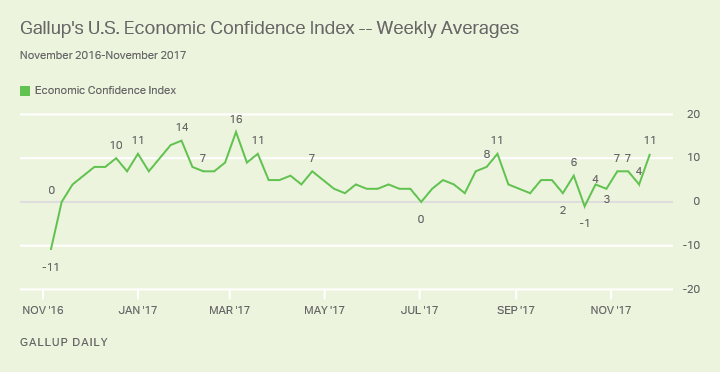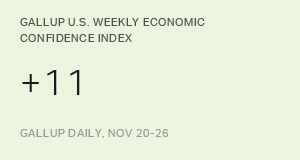STORY HIGHLIGHTS
- U.S. Economic Confidence Index averaged +11 last week
- November average rises to +7 from October’s +3
- Economic outlook component positive for first time since August
WASHINGTON, D.C. — Americans’ confidence in the economy spiked last week, with Gallup’s U.S. Economic Confidence Index averaging +11 for the week ending Nov. 26 — an increase of seven points from the previous reading of +4.
Last week included the Thanksgiving holiday, one of the happiest days of the year for Americans, as Gallup has previously found. Gallup has typically seen a slight uptick in economic confidence on Thanksgiving as a result. During Thanksgiving week from 2008 through 2016, the index’s weekly score has increased, on average, by 2.6 points from the prior week.
But last week’s gain in economic confidence was more than twice as large as the average gain. This may be a result of the improving economy which, in turn, has allowed more Americans to have the resources to enjoy the holiday week by traveling or shopping. To that point, AAA estimated that the highest number of Americans traveled this past Thanksgiving week since 2005.
Likewise, retail sales occurring on Black Friday weekend were projected to grow by 47% this year. Gallup’s broader look at Americans’ estimated spending on Christmas gifts suggests retailers are in store for a strong holiday shopping season.
Economic confidence rose last week among various demographic and political subgroups, including some that have been pessimistic about the economy this year. This includes Democrats, whose confidence rose nine points last week, though it remained negative at -16. Similarly, confidence among Americans earning less than $36,000 a year stood at -6, compared with -16 the week before.
Confidence rose by more modest amounts among Republicans and Americans earning between $36,000 to less than $90,000. However, confidence did increase significantly among those making $90,000 or more, similar to the increase among those in the lowest income group.
| Nov. 13-19 | Nov. 20-26 | Change | ||||||||||||||||||||||||||||||||||||||||||||||||||||||||||||||||||||||||||||||||||||||||||||||||||
|---|---|---|---|---|---|---|---|---|---|---|---|---|---|---|---|---|---|---|---|---|---|---|---|---|---|---|---|---|---|---|---|---|---|---|---|---|---|---|---|---|---|---|---|---|---|---|---|---|---|---|---|---|---|---|---|---|---|---|---|---|---|---|---|---|---|---|---|---|---|---|---|---|---|---|---|---|---|---|---|---|---|---|---|---|---|---|---|---|---|---|---|---|---|---|---|---|---|---|---|---|
| Party ID | ||||||||||||||||||||||||||||||||||||||||||||||||||||||||||||||||||||||||||||||||||||||||||||||||||||
| Democrat/Lean Democrat | -25 | -16 | +9 | |||||||||||||||||||||||||||||||||||||||||||||||||||||||||||||||||||||||||||||||||||||||||||||||||
| Republican/Lean Republican | +44 | +50 | +6 | |||||||||||||||||||||||||||||||||||||||||||||||||||||||||||||||||||||||||||||||||||||||||||||||||
| Annual Household Income | ||||||||||||||||||||||||||||||||||||||||||||||||||||||||||||||||||||||||||||||||||||||||||||||||||||
| Household earns less than $36,000 | -16 | -6 | +10 | |||||||||||||||||||||||||||||||||||||||||||||||||||||||||||||||||||||||||||||||||||||||||||||||||
| Earns $36,000 to less than $90,000 | +7 | +10 | +3 | |||||||||||||||||||||||||||||||||||||||||||||||||||||||||||||||||||||||||||||||||||||||||||||||||
| Earns $90,000 or more | +19 | +28 | +9 | |||||||||||||||||||||||||||||||||||||||||||||||||||||||||||||||||||||||||||||||||||||||||||||||||
| GALLUP | ||||||||||||||||||||||||||||||||||||||||||||||||||||||||||||||||||||||||||||||||||||||||||||||||||||
Thanks to the recent uptick, the weekly average of Gallup’s U.S. Confidence Index is now at its highest level since mid-August. This also closes a relatively strong month for the index, which averaged +7 in November (based on Oct. 30-Nov. 26 interviewing), the highest monthly score since March 2017 (+9). Gallup’s U.S. Economic Confidence Index averaged +3 in October.
Gallup’s U.S. Economic Confidence Index is the average of two components: how Americans rate current economic conditions and whether they feel the economy is improving or getting worse. The index has a theoretical maximum of +100 if all Americans were to say the economy is doing well and improving, and a theoretical minimum of -100 if all were to say the economy is doing poorly and getting worse.
Nearly four in 10 Americans (37%) described the economy as “good” or “excellent” last week, while 19% characterized it as “poor.” As a result, the current condition component rose five points to +18, tying its highest level since Gallup began tracking economic confidence in 2008.
Meanwhile, the economic outlook component not only improved last week, it crossed over into positive territory for the first time since mid-August. The component rose eight points to register +3 over Thanksgiving week, as 49% of Americans said the economy was “getting better” and 46% said the economy was “getting worse.”
by Andrew Dugan


